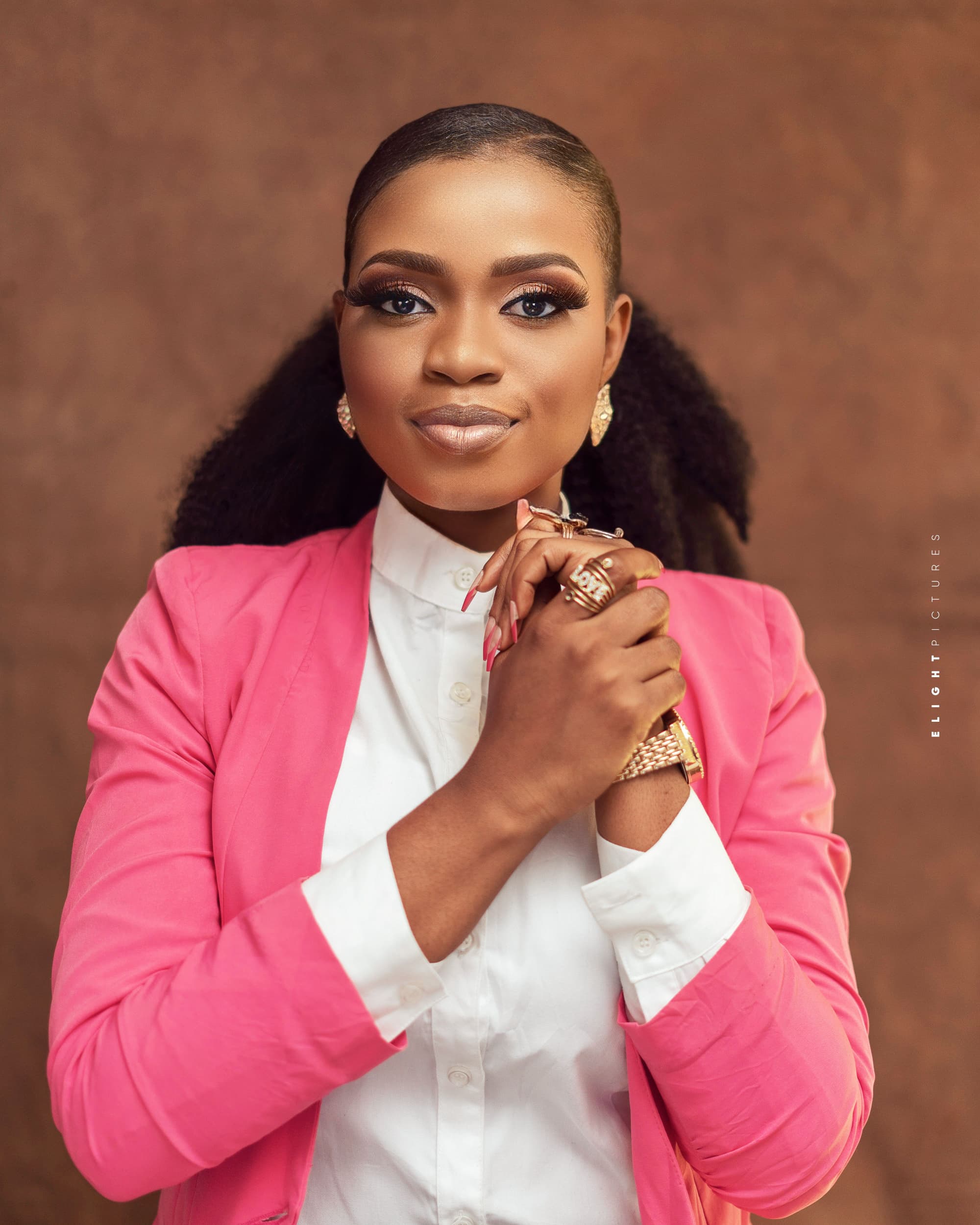
Deborah Adediran is Reimagining Waste and Designing the Future of African Fashion.
Deborah Adediran is the founder of DIYA Collections, a Nigerian-based sustainable fashion brand turning post-consumer plastic waste into tech-enabled, functional bags. With a background in biomedical engineering, Deborah brings a research-driven approach to eco-fashion embedding NFC technology into her designs to enhance traceability, transparency, and consumer engagement.
Driven by a personal experience with flooding linked to plastic pollution, Deborah is building a circular business model that merges innovation, style, and sustainability. Her mission: to prove that African fashion can be both beautiful and climate-responsible serving people, protecting the planet, and shaping a new era of conscious consumption.
1. Can you introduce yourself? What is your name, and how do you combine your roles as an entrepreneur and environmentalist?
My name is Deborah Adediran, and I am the founder of DIYA Collections, a sustainable fashion brand based in Nigeria that transforms post-consumer single-use plastic waste into tech-enabled, functional and fashionable bags.
My background in biomedical engineering strengthens my approach to sustainable fashion bringing a research-driven, problem-solving mindset into the heart of eco-innovation.
At DIYA, we are proud to pioneer “Africa’s first Sustainable Smart Bag”, a tech-enabled, eco-conscious product that combines fashion, function, and innovation. By embedding NFC technology into our bags, we’re able to promote traceability, transparency, and user engagement while also inspiring our users.
As both an entrepreneur and environmentalist, I’m building circular business models that reduce plastic pollution, promote resource efficiency, and inspire climate-conscious consumption. For me, sustainability is not a trend, it’s a mandate.
DIYA is more than a brand: it’s a regenerative fashion ecosystem where African fashion becomes a force for climate action, responsible consumption, and systemic change. It’s where fashion doesn’t just look good, but truly SERVES the PEOPLE and SAVES the PLANET.
2. What inspired you to start DIYA Collection and focus on sustainability in fashion?
The inspiration for DIYA Collections was deeply personal. As a teenager, I nearly lost my life in a devastating flood, an environmental disaster worsened by clogged drains filled with plastic waste. That experience shaped my lifelong commitment to environmental solutions.
As I grew, I saw fashion not just as a means of self-expression but as a powerful industry capable of transforming systems. With DIYA, I wanted to prove that African fashion can be both beautiful and radically responsible addressing pollution, creating jobs, and telling stories that matter.
3. As an environmentalist, how do you see the fashion industry contributing to environmental challenges, and how does DIYA Collection address these issues?
The fashion industry is one of the world’s most resource-intensive and polluting sectors. From microplastics in synthetic textiles to overproduction and landfill overflow, fashion contributes significantly to climate change and waste mismanagement.
At DIYA Collections, we operate on a circular design philosophy: reclaiming single-use plastic waste and converting it into durable fashion accessories. We embed NFC technology in our products for traceability, transparency, and digital storytelling. Our model reduces virgin material dependence, promotes local craftsmanship, and empowers consumers to make sustainable style choices.
4. Can you walk us through your process of turning plastic waste into eco-friendly bags?
Our circular fashion process begins with “plastic recovery”. We work with community waste collectors to gather discarded single-use plastic bags. These are cleaned, sorted, and fused into sheets or woven together to create “plabrics” that are now used to design our products.
Our design process prioritizes functionality, style, longevity, and ethical craftsmanship. The final pieces are handcrafted by our team of skilled designers integrating both aesthetic value and environmental integrity. Every DIYA bag is a product of circular innovation and climate action.
5. What impact has your work had on reducing plastic waste and promoting sustainability?
We’ve diverted hundreds of kilos of single-use plastic from the environment, transformed it into desirable fashion products, and created meaningful livelihoods in the process. But our impact goes beyond waste reduction, we’re changing narratives.
By offering a desirable, functional alternative to fast fashion, we’re shifting the narrative and proving that eco-friendly doesn’t mean boring. DIYA has become a catalyst for eco-literacy, circular design thinking, and climate-conscious consumer behavior in Africa. Through public education, digital campaigns, and product storytelling, we’re cultivating a community that sees waste as a resource and fashion as a force for good.
6. How do you raise awareness about sustainability and environmental responsibility through your brand?
We tell stories through our content, our packaging, and even through technology. Our bags have NFC chips that show their journey from waste to purpose, and sometimes share motivational messages with the carrier. We also create educational content and attend eco events to connect with conscious communities.
Through immersive storytelling and transparent practices, we are building an ecosystem of informed, responsible, and inspired consumers.
7. What role has the EBN group played in supporting your mission as an environmentalist and entrepreneur?
The EBN group has played a foundational role by providing a network of values-aligned entrepreneurs, strategic mentorship, and opportunities for visibility. In a landscape where social entrepreneurship can be isolating, EBN has been a powerful anchor validating our mission and accelerating our capacity to scale impact. It’s not just a community; it’s a catalyst for innovation and purpose-led business growth.
8. How do you ensure that your products resonate with both fashion-conscious consumers and environmentally aware audiences?
We believe sustainability should never compromise style. Our customers don’t have to choose between looking good and doing good.
At DIYA we adopt a dual-value approach, designing products that are aesthetically compelling while deeply rooted in sustainability. Our consumers are not just buying a bag; they’re buying into a lifestyle that reflects responsibility and refinement.
Every DIYA piece is intentionally designed to be versatile, stylish, and functional, meeting the expectations of modern, eco-aware consumers. We use market research, trend forecasting, and community feedback to ensure we’re aligned with evolving sustainable fashion preferences.
9. What future initiatives or collaborations are you planning to further your impact on the environment?
We are actively exploring bio-based alternatives to plastic, including materials derived from agricultural and plant waste. Our R&D efforts are focused on innovating new textiles that are both biodegradable and locally sourced.
We’re also designing community recycling hubs and planning a campaign to onboard 10,000 women across Africa into sustainable entrepreneurship through upcycling, sales, and education. Through strategic collaborations, we aim to expand our product range, increase impact visibility, and advance climate-smart innovation in the fashion industry.
10. What advice would you give to other entrepreneurs who want to merge sustainability and business, particularly in the fashion industry?
Design with the planet in mind. Don’t just create fashion pieces that serve the people, let your pieces save the planet too.
Sustainable fashion is not just about swapping materials, it’s about rethinking value chains, production systems, and customer relationships. Don’t wait for perfect conditions. Start where you are, but stay committed to regeneration, transparency, and long-term impact. Sustainability is a leadership mindset, not a marketing strategy.


